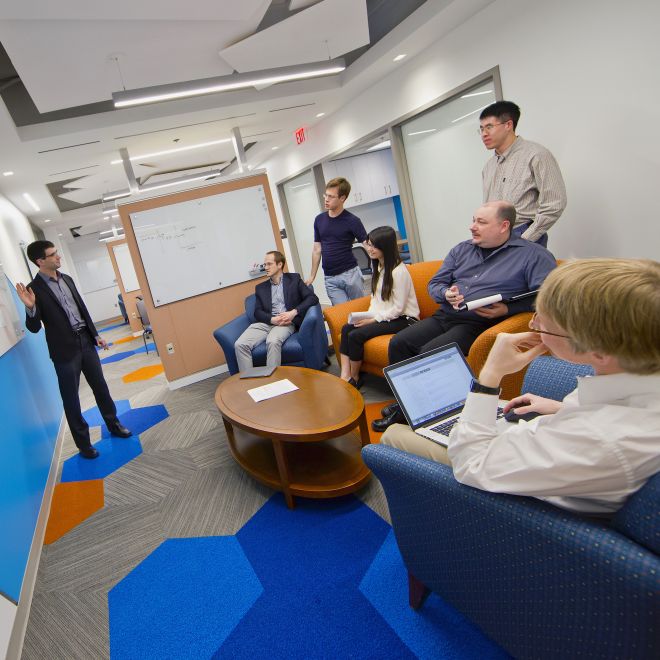
The Joint Center for Quantum Information and Computer Science(link is external) (QuICS) plans to celebrate its five-year anniversary with a daylong research symposium expected to draw top quantum experts from across the region and beyond.
Launched in October 2014 as a partnership between the University of Maryland and the National Institute of Standards and Technology(link is external) (NIST), the core mission of QuICS is to advance research and education in quantum computer science and quantum information theory.
The symposium—set for January 22, 2020 at the Brendan Iribe Center for Computer Science and Engineering—is geared toward researchers and students, as well as the Center's academic, government, and industry partners focused on quantum computing and quantum information science.
It will feature talks by Eddie Farhi(link is external) (Google/MIT), John Preskill(link is external) (Caltech), and Barbara Terhal(link is external) (TU Delft), and by QuICS alumni Michael Jarret(link is external) (Booz Allen Hamilton), Shelby Kimmel(link is external) (Middlebury College), and Neil Julien Ross(link is external) (Dalhousie University).
“The symposium is a way to reflect on the many successes we’ve had and also to explore our evolving research priorities moving forward,” says Andrew Childs(link is external), a professor of computer science at the University of Maryland and co-director of QuICS.
Some the Center’s successes are tangible, Childs notes, such as the almost 400 academic papers published in the past five years by QuICS faculty, postdocs, and students.
Other factors aren’t as easily quantified, yet are equally important, he adds. This includes the strong interdisciplinary nature of QuICS, where UMD faculty in computer science and physics work side-by-side with federal scientists and others on theoretical and experimental research involving quantum algorithms, quantum complexity theory, quantum cryptography, applications of quantum information to physics, and more.
QuICS researchers also collaborate with scientists and students in the Joint Quantum Institute(link is external) (JQI), which is focused on laying the foundation for engineering and controlling complex quantum systems capable of using the coherence and entanglement of quantum mechanics.
“Working closely with our federal partners, we’ve made a concerted effort to establish the University of Maryland as an epicenter for significant advances in quantum computing and quantum information science,” says Jake Taylor(link is external), a federal scientist at NIST and co-director of QuICS.
A considerable part of the activities in QuICS revolve around education, with a robust group of graduate students who gain new insight through hands-on research and by interacting with a diverse group of visiting scientists that QuICS hosts each year.
Other academic strength can be found in the center’s Hartree Postdoctoral Fellowship(link is external) program, which recruits talented early-career quantum information scientists to work at UMD for up to three years.
The fellowship program has been extremely successful since its launch in early 2015, and its alumni have gone on to prestigious positions at other institutions. Of the 10 postdocs named as Hartree Fellows, four are now in tenure-track faculty positions, two have joined leading industry research groups, and one develops software at Google. The remaining three are currently at QuICS.
QuICS has also played host to numerous major conferences and workshops. These include:
• A five-day workshop(link is external) in 2015 examining the frontiers of quantum information and quantum computer science.
• A workshop in 2016(link is external) focused on the role of entanglement—a kind of uniquely quantum correlation between separated systems—in protocols for verifying quantum proofs.
• The 6th International Conference on Quantum Cryptography(link is external) (QCrypt 2016), the foremost annual meeting on the theory and practice of quantum cryptography.
• A workshop in 2017(link is external) exploring connections between quantum complexity theory and high-energy physics.
• The 4th International Conference on Quantum Error Correction(link is external) (QEC17), the world’s premier scientific meeting focused on the protection of quantum computers from their hostile surroundings.
• A workshop in 2018(link is external) discussing the emerging field of quantum machine learning, a discipline that seeks to wed the promise of quantum computing with the tools and techniques that help ordinary computers learn from data.
• And most recently, the 14th Conference on the Theory of Quantum Computation, Communication and Cryptography(link is external) (TQC 2019) and an associated workshop on Noisy Intermediate-Scale Quantum (NISQ) Technologies(link is external), which attracted more than 250 scientists from around the world to explore quantum computer science and quantum physics.
***
WHAT: QuICS Five-Year Anniversary Symposium
WHEN: January 22, 2020 from 8:30 a.m.– 5 p.m.
WHERE: Brendan Iribe Center for Computer Science and Engineering, University of Maryland
REGISTER: Seating for this event is limited. We ask that those who register make a commitment to attend so as not to preclude others from attending if registration fills up. Go here(link is external) to register.
QuICS is a partnership between the University of Maryland and the National Institute of Standards and Technology. It is one of seven major centers in the University of Maryland Institute for Advanced Computer Studies.

